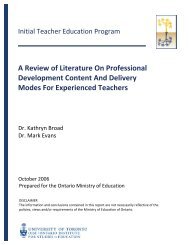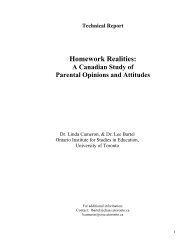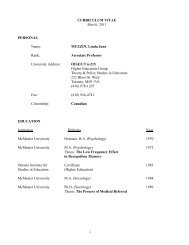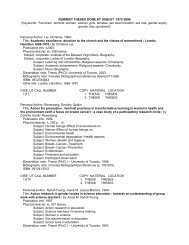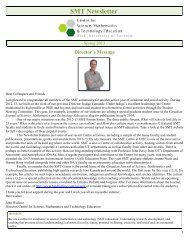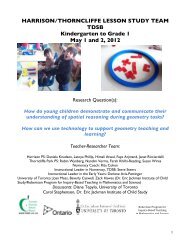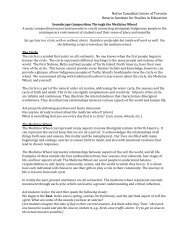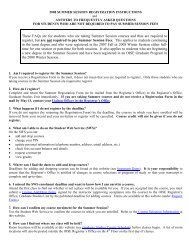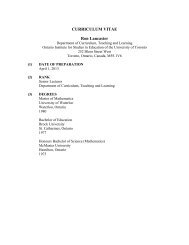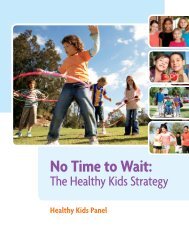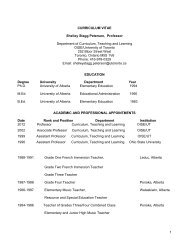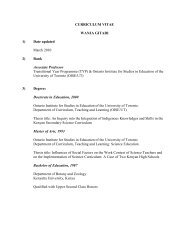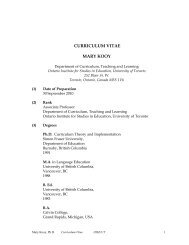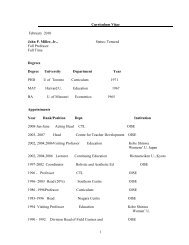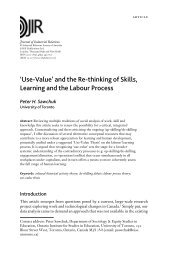The Ontario Curriculum, Grades 9-12 - Ministère de l'éducation ...
The Ontario Curriculum, Grades 9-12 - Ministère de l'éducation ...
The Ontario Curriculum, Grades 9-12 - Ministère de l'éducation ...
You also want an ePaper? Increase the reach of your titles
YUMPU automatically turns print PDFs into web optimized ePapers that Google loves.
Aboriginal Governance: Emerging Directions, Gra<strong>de</strong> <strong>12</strong>,<br />
University/College Preparation (NDG4M)<br />
I<strong>de</strong>ntity<br />
– i<strong>de</strong>ntify traditional beliefs and values that are part of Aboriginal i<strong>de</strong>ntity and that affect<br />
Aboriginal <strong>de</strong>cision making and lea<strong>de</strong>rship<br />
Challenges<br />
– <strong>de</strong>scribe the difference in how land is perceived by Aboriginal society and by Canadian<br />
society (e.g., in terms of respect for the land and all living things, compatible resource<br />
<strong>de</strong>velopment, and sustainable small-scale economies) and explain the crucial importance<br />
of this difference to governance among Aboriginal peoples<br />
– <strong>de</strong>scribe how the ways in which Aboriginal peoples perceive land (e.g., the Aboriginal<br />
belief that human beings were given special responsibilities to serve as stewards of the<br />
natural environment) may affect the future of Aboriginal and Canadian relations<br />
Issues of Indigenous Peoples in a Global Context, Gra<strong>de</strong> <strong>12</strong>,<br />
University/College Preparation (NDW4M)<br />
I<strong>de</strong>ntity<br />
• <strong>de</strong>scribe emerging global economic and environmental practices and their impact on<br />
indigenous cultural i<strong>de</strong>ntity<br />
– <strong>de</strong>scribe the legal and political perspectives of the world views of indigenous peoples<br />
concerning their own social, economic, or cultural <strong>de</strong>velopment (e.g., regarding<br />
governance, resource <strong>de</strong>velopment, or the preservation of indigenous languages);<br />
– <strong>de</strong>scribe how indigenous peoples throughout the world have maintained the core<br />
principles of an indigenous world view (e.g., land stewardship; cooperation; reciprocal<br />
relationships, such as “people with the Creator”, “people with people”, and “people with<br />
the environment”) or have lost their traditional ways (e.g., <strong>de</strong>struction of the rain forest)<br />
– <strong>de</strong>fine the factors that indigenous peoples believe are critical for ensuring healthy,<br />
sustainable communities (e.g., a secure land base, political autonomy, a viable<br />
community-based economy)<br />
– <strong>de</strong>monstrate an un<strong>de</strong>rstanding of the different political, economic, and environmental<br />
issues that unite indigenous peoples throughout the world (e.g., <strong>de</strong>colonization, economic<br />
exploitation, preservation of biodiversity)<br />
Relationships<br />
– <strong>de</strong>monstrate an un<strong>de</strong>rstanding that the North American Aboriginal cultural perspective on<br />
land is shared by indigenous peoples in various parts of the world<br />
Native Studies 95



